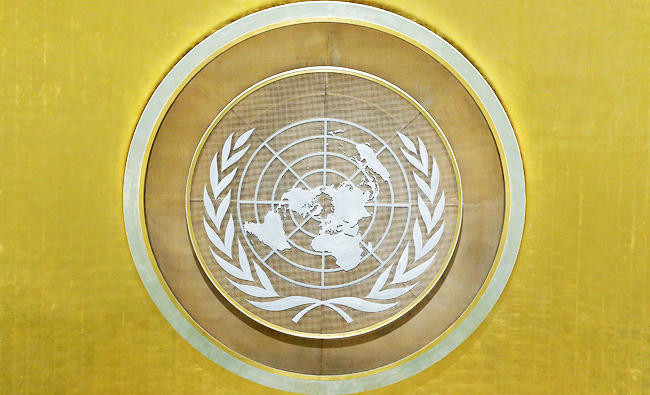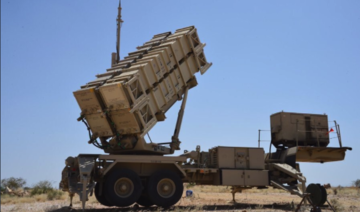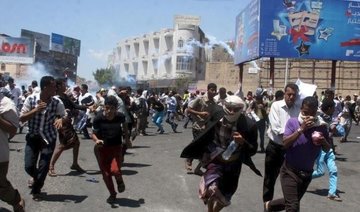JEDDAH/NEW YORK: The UN was urged on Saturday to take action against Iran for breaking an arms embargo by illegally supplying missiles to Houthi militias in Yemen.
The calls followed a UN Security Council (UNSC) resolution late on Friday that condemned “in the strongest possible terms” last week’s Houthi ballistic missile attack targeting Al-Yamamah Royal Palace in Riyadh.
All 15 council members “expressed alarm at the stated intention of the Houthis to continue these attacks against Saudi Arabia, as well as to launch additional attacks against other states in the region.”
The council urged all UN member states to fully implement the arms embargo against Houthi militias as required by the relevant Security Council resolutions, and expressed its grave concern about continuing violations of the embargo.
It called again for all parties to engage constructively in the peace efforts of Esmail Ould Shaikh Ahmad, the UN secretary-general’s special envoy for Yemen.
The condemnation was fully merited but the Security Council should have gone farther, analysts and experts told Arab News.
“In addition to expressing grave concern, the UN should take action against Iran, the country that has provided the Houthis with the missiles that targeted Riyadh. Iran is the only country that continues to violate the arms embargo imposed by the UNSC Resolution 2216, which was issued under Chapter VII of the UN Charter,” said Abdel Aziz Aluwaisheg, the assistant secretary-general for political and negotiation affairs at the Gulf Cooperation Council.
“Instead of merely expressing generic concern at the continued non‑implementation of previous Security Council resolutions, it should have named the party that has refused so far to come back to the negotiating table. That party is the Iranian-allied Houthi militias.
“The government of Yemen has ‘engaged constructively’ with the UN special envoy, but the Houthis have failed to return to negotiations toward reaching a final and comprehensive agreement to end the conflict.”
The council’s statement “reaffirms the international community’s commitment to finding a political solution to the conflict in Yemen,” Fahad Nazer, a fellow at the National Council on US-Arab Relations, told Arab News.
“It also makes clear that the Houthis have not only alienated their fellow Yemeni citizens by trying to impose their will on the rest of Yemeni society but they have also been widely condemned by the international community.
“Their callous disregard for the safety and security of the people of Yemen and their continuing violations of international resolutions and laws by targeting civilians and infrastructure in Saudi Arabia has made them international pariahs.”
Houthi desperation
“As the Houthis lose territory and the scant support they have left in Yemen, they have attempted to broaden and further complicate the conflict by increasing their attacks against Saudi Arabia and by threatening to attack the UAE. These tactics are indicative of their desperation, as they find themselves isolated at home and abroad.”
Dr. Hamdan Al-Shehri, a political analyst and international relations scholar in Riyadh, called for serious measures to prevent the Iran-backed militias from threatening regional peace. The Security Council should take action to halt Iranian aggression, which posed a threat to many Arab countries such as Lebanon and Iraq, he said.
The international community should focus on ways of stopping Iran from supporting terrorism, Al-Shehri said. “If they don’t want to punish Iran now, at least stop these militias.”
Experts also urged the UN to ensure that Yemen’s Red Sea port of Hodeidah, which is occupied by the Houthis, was not used as a supply route for Iranian missiles and other arms.
The Saudi-led Arab Coalition in Yemen closed the port last month after a Houthi ballistic missile attack on Riyadh on Nov. 4. It later reopened to receive shipments of humanitarian aid and relief supplies, and remains operational despite last Tuesday’s further missile attack on the Saudi capital, and evidence that both missiles were supplied by Iran.
“While the UN Security Council is no doubt very concerned about the humanitarian situation in Yemen, it should take action by deploying UN staff to supervise the port of Hodeidah to make sure that it is used solely for civilian purposes and not as a conduit for Iranian weapons,” Aluwaisheg told Arab News.
Medical and food aid
Aid delivered through the ports of Hodeidah and Salif is also being misappropriated by the Houthi militias, the Coalition said on Saturday. Its spokesman, Col. Turki Al-Maliki, accused the Houthis of hampering the distribution of vaccines and stealing medical and food aid.
The theft of vaccines is particularly serious, after the International Committee of the Red Cross said there were now one million cases of cholera in Yemen and they expect another serious outbreak next March and April.
The King Salman Center for Relief and Humanitarian Aid has established more than 250 projects in Yemen at a cost of $895 million, its general supervisor, Dr. Abdullah Al-Rabeeah, said on Saturday.
The projects are operated with local partners and specialized UN agencies, and cover health, sanitation and programs for women and children.















